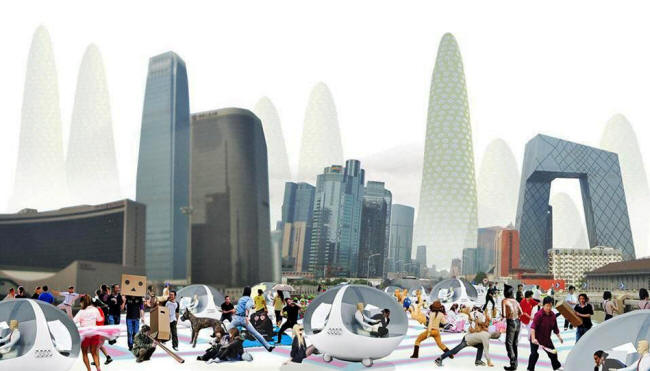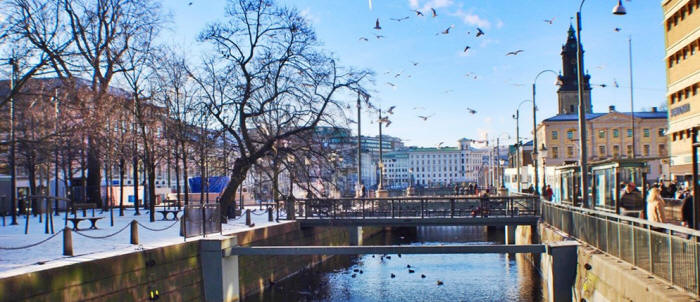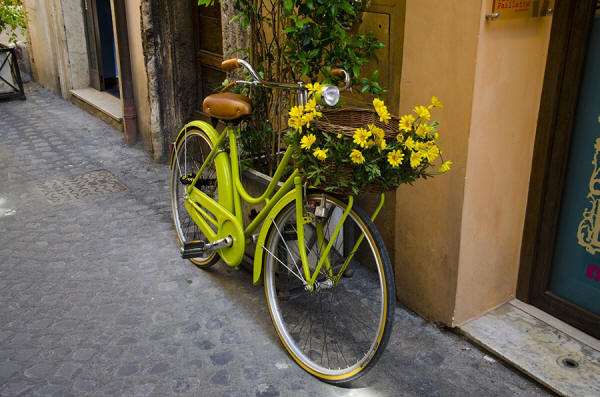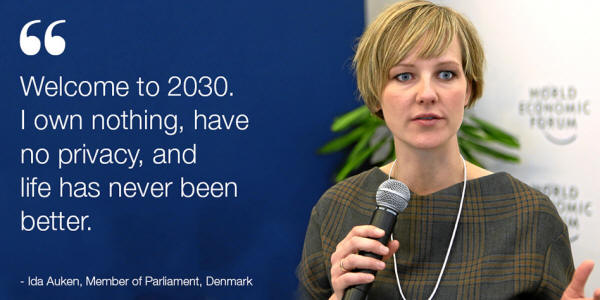|

by HAFHAF
October
28, 2020
from
HumansAreFree Website
Information sent by
MJGdeA

World Economic
Forum
Article from
2016...
The following article was
published back in 2016 (Here's
how life Could Change in my City by the year 2030), by the already infamous
World Economic Forum, an
international NGO of totalitarian globalists who want
to establish a
New World Order, under the guise of
sustainability and protecting the environment.
It was written by
Ida Auken, a member of the
Parliament of Denmark (Folketinget).
You will see how this socialist dystopia is presented as something
wonderful and desirable, but it is everything that it
was warned you about in the past 10 years about.
As you will read through, you will undoubtly understand that it is
impossible to achieve their vision for the 7.8 billion people that
are alive today.
For this plan to work,
over 90% of the
people that are alive today, would have vanish...
This can be achieved in
various ways,
from
weaponized viruses that will
wipe most of us out in just a few years, to more subtle ways,
such as infertility and sterilization...
The remaining people,
probably around half a billion in total (as written in
The Georgia Guidestones), will be
crammed in several MegaCities (as proposed in their vision
2030 Agenda), and make the rest of
the world off-limits to them.
As I've mentioned in the beginning, all in the name of protecting
the environment.
But since humans will not
be allowed to leave the MegaCities, as you will see,
who do you think get
to enjoy the 99.9% of the uninhabited planet?
The
"elite"
0.1%-ers and their cronies...
You can read the article below, and I will make some final comments
at the end of the article:
Welcome to 2030
-
I own
nothing, have no privacy, and life has never been better
-
by
Ida
Auken
Member of
Parliament,
Parliament of
Denmark (Folketinget)
November 11, 2016
from
WebEconomicForum Website
recovered through
WayBackMachine Website
Actual October 2020 WebEconomicForum Link...

"Now I can hardly believe
that we
accepted congestion and traffic jams."
Image: REUTERS/Nicky Loh
Welcome to
the year 2030...
Welcome to my
city - or should I say, "our city". I don't own
anything. I don't own a car. I don't own a house. I
don't own any appliances or any clothes.
It might seem odd to you, but it makes perfect sense for
us in this city. Everything you considered a product,
has now become a service.
We have access to transportation, accommodation, food
and all the things we need in our daily lives. One by
one all these things became free, so it ended up not
making sense for us to own much.
First communication became digitized and free to
everyone. Then, when clean energy became free, things
started to move quickly.
Transportation dropped dramatically in price. It made no
sense for us to own cars anymore, because we could call
a driverless vehicle or a flying car for longer journeys
within minutes.
We started transporting ourselves in a much more
organized and coordinated way when public transport
became easier, quicker and more convenient than the car.
Now I can hardly believe that we accepted congestion and
traffic jams, not to mention the air pollution from
combustion engines.
What were we
thinking?

Sometimes I
use my bike when I go to see some of my friends. I enjoy
the exercise and the ride. It kind of gets the soul to
come along on the journey.
Funny how some things seem never seem to lose their
excitement:
walking,
biking, cooking, drawing and growing plants.
It makes
perfect sense and reminds us of how our culture emerged
out of a close relationship with nature.
"Environmental problems seem far away"
In our city we don't pay any rent, because someone else
is using our free space whenever we do not need it.
My living
room is used for business meetings when I am not there.
Once in awhile, I will choose to cook for myself. It is
easy - the necessary kitchen equipment is delivered at
my door within minutes.
Since transport became free, we stopped having all those
things stuffed into our home.
Why keep a
pasta-maker and a crepe cooker crammed into our
cupboards? We can just order them when we need them.
This also made the breakthrough of the circular economy
easier. When products are turned into services, no one
has an interest in things with a short life span.
Everything is designed for durability, reparability and
recyclability. The materials are flowing more quickly in
our economy and can be transformed to new products
pretty easily.
Environmental problems seem far away, since we only use
clean energy and clean production methods.
The air is clean, the water is clean and nobody would
dare to touch the protected areas of nature because they
constitute such value to our well being.
In the cities we have plenty of green space and plants
and trees all over.
I still do
not understand why in the past we filled all free spots
in the city with concrete.
The death of shopping
Shopping? I can't really remember what that is.
For most of
us, it has been turned into choosing things to use.
Sometimes I find this fun, and sometimes I just want the
algorithm to do it for me. It knows my taste better than
I do by now.
When
AI and robots took over
so much of our work, we suddenly had time to eat well,
sleep well and spend time with other people.
The concept of rush hour makes no sense anymore, since
the work that we do can be done at any time.
I don't really know if I would call it
work
anymore. It is more like thinking-time, creation-time
and development-time.
For a while, everything was turned into entertainment
and people did not want to bother themselves with
difficult issues.
It was only at the last minute that we found out how to
use all these new technologies for better purposes than
just killing time.
"They live different kinds of lives outside of the city"
My biggest concern is all the people who do not live in
our city.
Those we lost
on the way. Those who decided that it became too much,
all this technology.
Those who felt obsolete and useless when robots and AI
took over big parts of our jobs. Those who got upset
with the political system and turned against it.
They live different kind of lives outside of the city.
Some have
formed little self-supplying communities. Others just
stayed in the empty and abandoned houses in small 19th
century villages.
Once in awhile I get annoyed about the fact that I have
no real privacy. No where I can go and not be
registered.
I know that, somewhere, everything I do, think and dream
of is recorded. I just hope that nobody
will use it against me.
All in all, it is a good life. Much better than the path
we were on, where it became so clear that we could not
continue with the same model of growth.
We had all these terrible things happening:
lifestyle
diseases, climate change, the refugee crisis,
environmental degradation, completely congested
cities, water pollution, air pollution, social
unrest and unemployment.
We lost way
too many people before we realized that we could do
things differently.
The end...
Video
The Great Reset - Davos
Agenda 2021
'You'll Own Nothing and Be Happy'
Transcript
00:04
'The pandemic represents a rare but narrow window of
opportunity to reflect, reimagine, and reset our world'
-. Klaus Schwab.
00:27
The great reset - a term that has become commonplace
since the turn of 2020. Used by unelected elites to
determine the direction of humanity post pandemic. Klaus
Schwab, founder and CEO of the World Economic Forum also
released a book with the same title.
00:46
What is the World Economic Forum? Quote, 'the World
Economic Forum is the international organization for
public private cooperation. The forum engages the
foremost political, business, cultural, and other
leaders of society to shape global, regional and
industry agendas.'
01:07
The great reset is essentially the World Economic
Forum's action plan to fundamentally change how the
world functions. It is using the pandemic as an
opportunity. Just by taking a glance at the website,
you'll see a heavy focus on environmental
sustainability, economic sustainability, poverty and
inequality. Sounds great, right? As does every other
utopian idea, all of them with 100% failure rate.
01:35
And before I continue, let's make it abundantly clear
that another term build back better is a branch off of
the great reset to capture the imagination of the
undiscerning crowd. How do we know if the so called
leaders of the world I mean, on this rhetoric? (Leaders
saying build back better)
02:31
If we take a look at the great reset page on the World
Economic Forum's website, we see a few vague but
compelling requests. It asks for global stakeholders to
cooperate in simultaneously managing the direct
consequences of the COVID-19 crisis, with a unique
window of opportunity to shape the recovery.
02:53
This initiative will offer insights to help inform all
those determining the future state of global relations,
the direction of national economies, the priorities of
societies, the nature of business models and management
of a global commons. They also mentioned the need for
new social contracts, because of course, these unelected
elites know exactly how the people and organizations
should interact with each other.
03:19
All in all, it's very vague. But it's blindingly obvious
that the people pulling the strings here are the rich,
powerful, unelected elite. And the common man is not
going to have any say in the direction of this so called
great reset. We cannot make any mistake, this isn't a
conspiracy theory. It is evident that the people behind
this opposing great reset, wish to radically change the
direction of humanity towards what they feel is a more
enlightened future.
03:49
'There is a tyranny in the womb of every utopia' - Bertrand to juvenile.
03:55
Most people want to see a better world, of course, but
these egomaniacs Do not ask the people what they want.
They expect everybody to think and act as they do. There
are almost 8 billion people on the planet. And yet a
room full of people consider themselves worthy of moving
humanity in the direction of their choice, no democracy,
no one to be held accountable. It is not a new
phenomenon to have a small group of elites trying to
bring about their own version of utopia.
04:25
Quite recently, we have had millions of deaths by
government genocide or mass starvation. Usually a
combination of the two. It always follows the initial
schema. Once we bring about our enlightened ideas, all
will be well and humanity will flourish. This is all for
the greater good. In the meantime, you better keep out
of our way and let us allow you to do what we know to be
right. This thinking cost about 100 million deaths in
the 20th century and as 100% failure rate. Still, Mr.
swab wants us to try this again. But this time with
advanced technology and on a global scale.
05:05
What are the other concerns with this? Suppose it
enlightened future? You'll own nothing and you'll be happy. This idea has warning written all over it. This is
so Orwellian. So authoritarians are so incredibly
uncaring of the views of the general population, that
it's pretty frightening.
05:27
The first problem with this, nobody has the right to
determine what will make anybody else happy. Any human
being with a reasonably developed psyche, can make that
decision for themselves.
05:39
Secondly, it isn't that nobody will own anything. The
reality is that a very few elites will own everything,
and the average person will have to settle with their
lot. You'll own Nothing can be happy, could be reframed,
will allow and everything and you'll have no choice but
to be happy.
05:59
The purpose of this sleight of hand is to remove private
ownership from the individual and small business, which
is the fundamental principle of prosperity. It is no
coincidence that the majority of wealth in the Western
world has been generated since the Enlightenment era of
the 17th to 18th century.
06:16
This is when private ownership became highly valued, and
prosperity followed relative to the rest of the world.
As proven ownership should be as broadly available as
possible and not focused in the hands of a few.
06:30
In modern times, we can see where this ideology of
owning nothing can take us. In China, there is a social
point system. If you act in ways which the political
elite deem incorrect, you can have your life turned
upside down in an instant. This is happening right now in
one of the most powerful countries on Earth.
06:51
Will this be sold to you as a monopoly by huge
corporations and the government? Of course not. Like the
terminology with the great reset, it will be sold to you
as owning nothing but being happy. The reality is that
the very few will own everything, the vast majority will
be at the mercy of their will.
07:11
So we invite you to question whether you are happy with
this small group of elites dictating the direction of
human race, no consultations, no democratic process.
There is no opt out button when this takes shape. After
all, your own nothing, but will you be happy?
07:31
What happens to the Renegades the dreamers, the writers,
the creators, the artists, the innovators, where will
they go in this high tech welfare state? But it would all
be okay because it's for your own good and the good of
everybody.
Spooky, right?
It's needless to point out that society and culture as we know them
today will vanish forever.
Without capitalism and competition, innovation will disappear.
With no financial incentives, creative arts, like the movie industry
will disappear. Music will be created by A.I., and clothes will look
all the same.
Of course, all traces of the old culture will have to vanish as
well, otherwise the people will end up dreaming of world in which
they could travel, go out for drinks, eat foods that actually taste
nice, or go to the movies, etc..
Without consumerism, variety will vanish as well. Instead of the
endless choices that we have today, the society envisioned by the
World Economic Forum will offer basic foods, basic drinks, basic
clothes, basic... everything.
Food will most probably focus on protein intake and it will come in
a small box or, worse, in the form of tablets that the people will
swallow twice a day.
In terms of beverages, you can forget about the hundreds of flavors
of soda, coffee, milk shakes, beers and wines.
There's no one "out there" to plant and harvest the coffee beans,
for example, no one to roast them, and no one to transport them -
and there's no financial incentive to do it anyway.
So, in terms of drinks, the people will have to do with water and an
energy drink of some kind - not for pleasure, but for productivity
purposes.
Seriously, you didn't expect to just lie around doing nothing
indefinitely, did you?
These Megacities may managed themselves for the most part, with the
help of
artificial intelligence (A.I.) and the heavy labor will be
mostly done by robots, but someone will have to build (and maintain)
the robots.
And someone will have to mine for the raw materials that will be
required by these Megacities. Robots will help, but humans will have
to do a lot of work as well, such as maintaining the plumbing, sewage
system, electric grid, etc..
And what will mankind get in return? A lot less than today, that's
for sure.
No private property, no personal transportation, no privacy, and no
freedom.
No art, no culture, no fashion and no little things that give us so
much pleasure today.
But there are going to be new drugs, I think. No dystopia is
complete without at least one potent drug - be it a drug that keeps
the people happy and distracted, as imagined by Aldous Huxely in a
Brave New World, or a drug that
devoid everyone of their human
emotions, as in Kurt Wimmer's
Equilibrium.
Regardless, the future has never looked so bleak!... if we allow it
to happen, that is...
|






